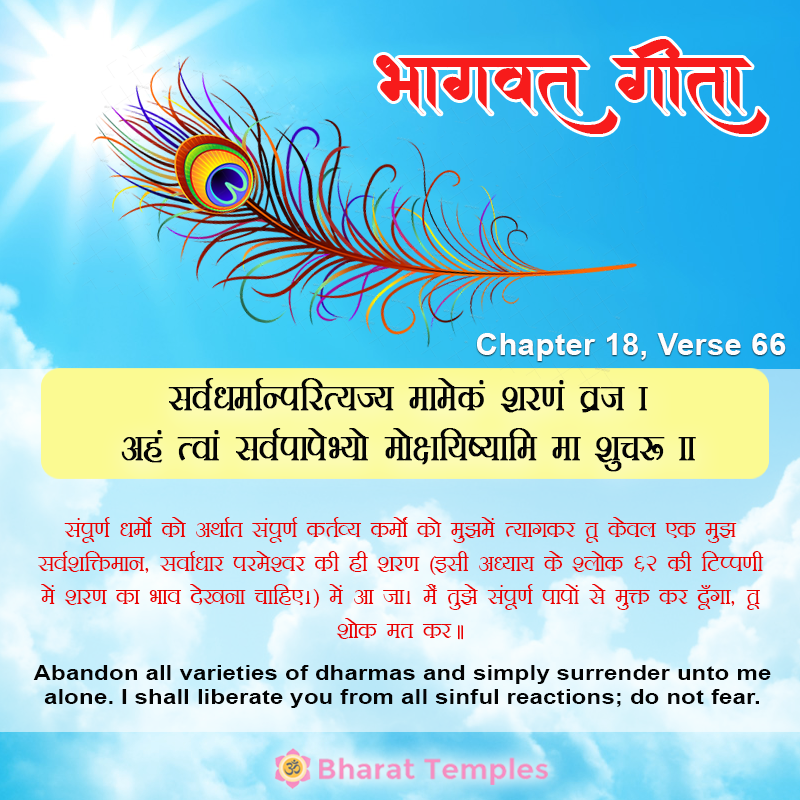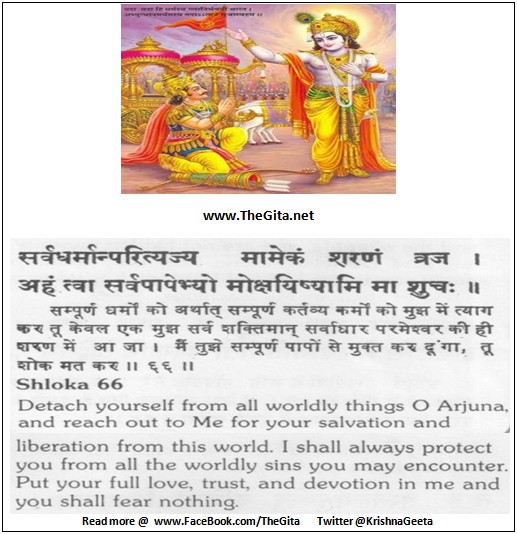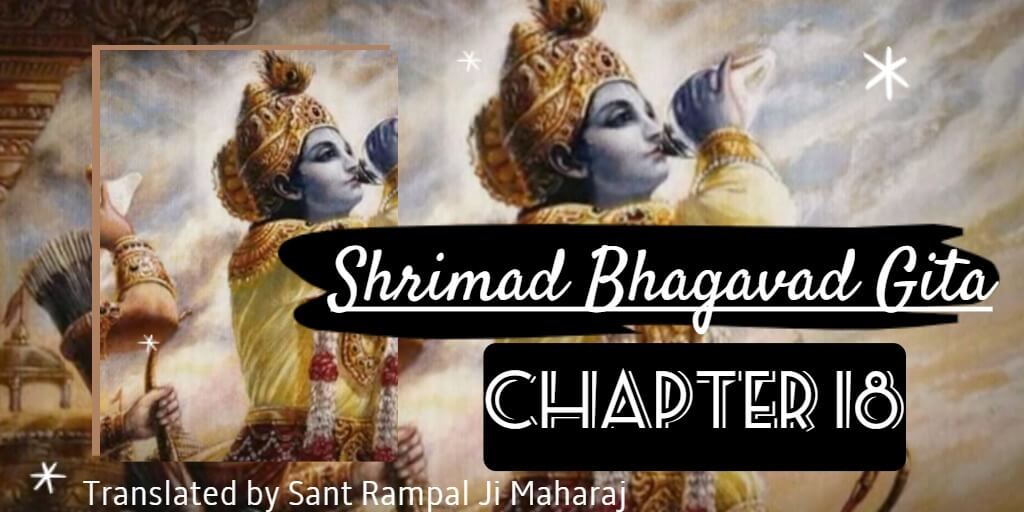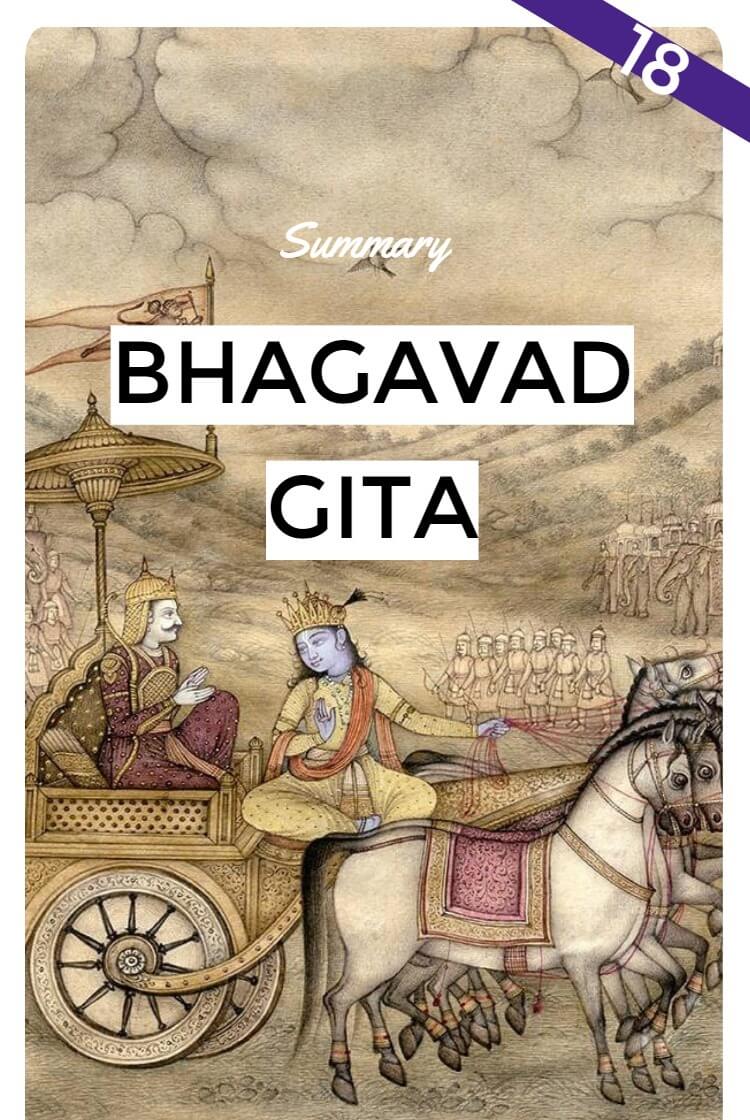
Bhagavad Gita Chapter 18, Verse 66 Bharat Temples
The Bhagavad-gita Verse 18.66, English translation, including the Vaishnava commentaries Sarartha-varsini-tika, Prakashika-vritti and Rasika-ranjana (excerpts). This is verse Verse 18.66 from the chapter 18 called "Moksha-yoga (the Yoga of Liberation)". Sanskrit text, Unicode transliteration, Word-for-word and English translation of.

Pin on Bhagavad Gita
Gita 18.66 explained - Chaitanya Charan Das, Bhagavad Gita ISKCON. Link to purport by A C Bhaktivedanta Swami Srila Prabhupada Transcript of Bhakti-Shastri class on this verse by Chaitanya Charan Bg 18.66 sarva-dharmān parityajya mām ekaṁ śaraṇaṁ vraja ahaṁ tvāṁ sarva-pāpebhyo mokṣayiṣyāmi mā śucaḥ Synonyms: sarva.

TheGita Chapter 18 Shloka 66 The Gita Shree Krishna Bhagwad Geeta
BG 18.66: Abandon all varieties of dharmas and simply surrender unto Me alone. I shall liberate you from all sinful reactions; do not fear. Commentary All along, Shree Krishna had been asking Arjun to do two things simultaneously—engage his mind in devotion, and engage his body in fulfilling his material duty as a warrior.

What Is The Bhagavad Gita Images and Photos finder
Prabhupada > Books > Bhagavad-gita As It Is (1972) > Bg 18 > Bg 18.66 : TEXT 66. sarva-dharman parityajya. mam ekam saranam vraja.. in full consciousness, is the most confidential part of knowledge, and this is the essence of the whole Bhagavad-gita. Karma-yogis, empiric philosophers, mystics, and devotees are all called transcendentalists,.

Bhagavad Gita Chapter 18 Verse 66 part 1 YouTube
The Bhagavad Gita, the ancient gospel of Hinduism, has been given a refreshing contemporary translation by B. Srinivasa Murthy, Ph.D. Murthy's translation, direct from the Sanskrit, is vivid and easily understood, while remaining true to the spirit of the original text. The book's lucid introduction explains the basic structure of Hindu.

Bhagavad Gita Chapter 18 Shloka 66 YouTube
Bhagavad Gita - The Song of God is the title of the Swami Prabhavananda and Christopher Isherwood's translation of the Bhagavad Gītā (Sanskrit: भगवद्गीता, "Song of God"), an important Hindu scripture. It was first published in 1944 with an Introduction by Aldous Huxley. This translation is unusual in that it is a collaboration between a world-renowned English language.

Bhagavad Gita 18.66 सर्व धर्मान परित्यज्य पलभर में सभी पापों से
Bhagavad Gita 18.66 Posted by The Editor | Sep 12, 2012 | Bhagavad Gita: Chapter 18 | 21,532 views sarva-dharmān parityajya mām ekaḿ śaraṇaḿ vraja ahaḿ tvāḿ sarva-pāpebhyo mokṣayiṣyāmi mā śucaḥ Translation of Bhagavad Gita 18.66 Abandon all varieties of religion and just surrender unto Me. I shall deliver you from all sinful reactions.

True Meaning of Shrimad Bhagavad Gita Chapter 18 by Sant Rampal Ji
The Lord has described various kinds of knowledge, processes of religion, knowledge of the Supreme Brahman, knowledge of the Supersoul, knowledge of the different types of orders and statuses of social life, knowledge of the renounced order of life, knowledge of nonattachment, sense and mind control, meditation, etc.
God/Brahman is the Ocean of Love and Consciousness (Divinity_IS
English Chapter 18: Mokṣha Sanyās Yog Yog through the Perfection of Renunciation and Surrender This last chapter of the Bhagavad Gita is the longest as it explicates many subjects.

Chaitanya Charan on Dharma and the Bhagavadgita (Gita 18.66) YouTube
The Bhagavad Gita (/ ˌ b ʌ ɡ ə v ə d ˈ ɡ iː t ɑː, -t ə /; Sanskrit: भगवद्गीता, IAST: bhagavad-gītā, lit."The Song of God"), often referred to as the Gita, is a 700-verse Sanskrit scripture that is part of the Hindu epic Mahabharata (chapters 23-40 of Bhishma Parva).. The Gita is set in a narrative framework of a dialogue between Pandava prince Arjuna and his.

Krishna reveals the ultimate secret, Gita 18.66 Essence of Bhagavad
The Lord has described various kinds of knowledge, processes of religion, knowledge of the Supreme Brahman, knowledge of the Supersoul, knowledge of the different types of orders and statuses of social life, knowledge of the renounced order of life, knowledge of nonattachment, sense and mind control, meditation, etc.

Bhagavad Gita Summary Chapter 18 Bhagavad Gita
Comment: The above translation of Bhagavad Gita 18 Verse 66 by Prabhupada is wrong. This verse 66 has a direct correlation with verse 62, where again Arjun is being instructed to go in to the refuge of some other Supreme God. In 18.66 it has been reiterated that Arjun seeks the refuge of some other God.

LEARNING BHAGAVAD GITA WITH MEANING CHAPTER 18 TEXT 66 HKM Mumbai
18.66 sarvadharman parityajya Gita Chapter 18 - Verse 66 « » Audio Player 00:00 00:00 सर्वधर्मान्परित्यज्य मामेकं शरणं व्रज । अहं त्वा सर्वपापेभ्यो मोक्षयिष्यामि मा शुचः ॥ १८-६६॥ sarvadharmānparityajya māmekaṃ śaraṇaṃ vraja ahaṃ tvā sarvapāpebhyo mokṣayiṣyāmi mā śucaḥ

Pin on Bhagvat Gita Shlokas
So it is adequately established with evidence thoughout Srimad Bhagavad-Gita from a multitude of Vedic scriptures that bhakti or exclusive loving devotion unto the Supreme Lord Krishna is the highest attainment and prime goal for all living entities. Thus ends commentaries of chapter 18, verse 66 of the Srimad Bhagavad-Gita. Verse 66.

"Bhagavad Gita 18.66" Sergio Vigagni YouTube
Holy scriptures Sampradayas Teachers—acharyas Related traditions v t e The Bhagavad Gita ( / ˌbʌɡəvəd ˈɡiːtɑː /; Sanskrit: भगवद्गीता, romanized : bhagavad-gītā, lit. 'The Song by God' [a] ), often referred to as the Gita ( IAST: gītā ), is a 700-verse Hindu scripture, which is part of the epic Mahabharata.

Bhagavad Gita 18.66 Cultural Samvaad Indian Culture and Heritage
Abandon all duties and take refuge in Me alone; I will liberate you from all sins; do not grieve. Commentary 18.66 सर्वधर्मान् all duties? परित्यज्य having abandoned? माम् to Me? एकम् alone? शरणम् refuge? व्रज take? अहम् I? त्वा thee? सर्वपापेभ्यः from all sins? मोक्षयिष्यामि will liberate? मा dont?